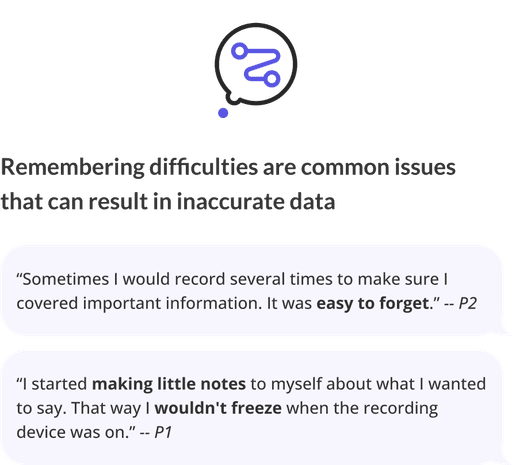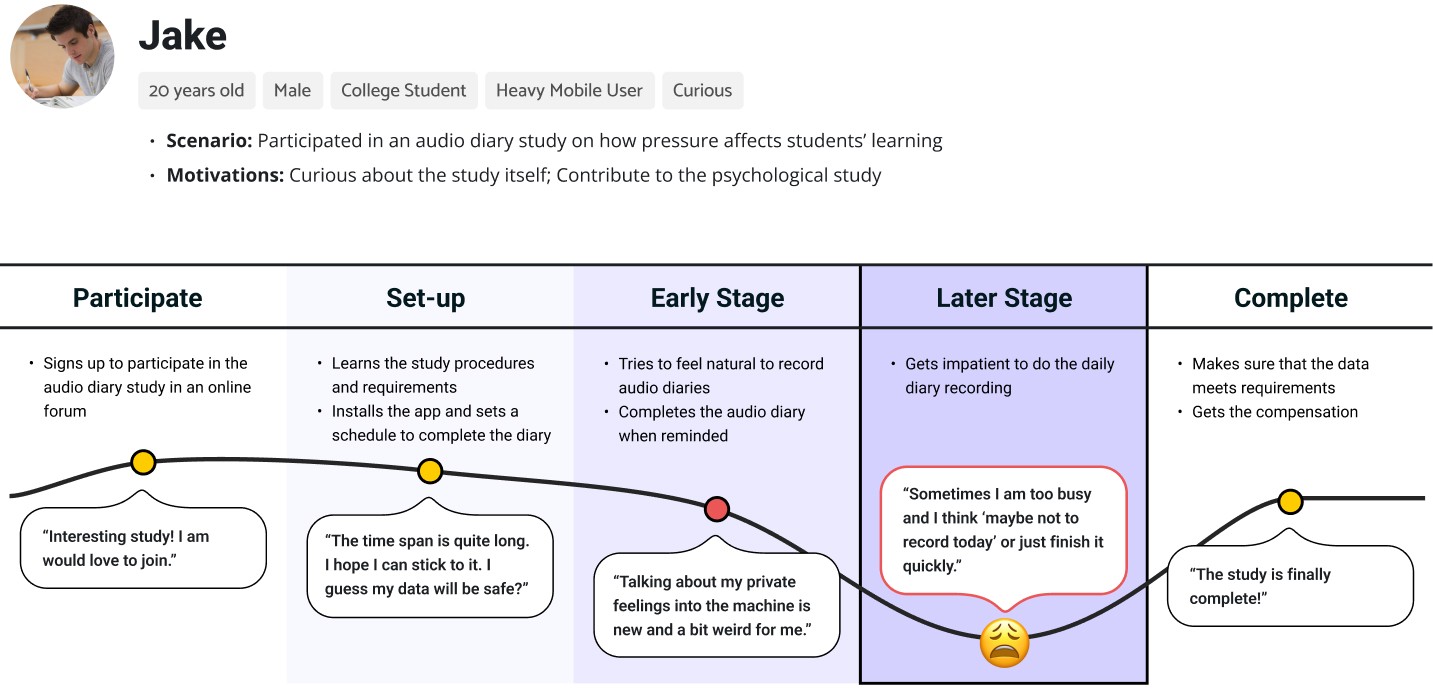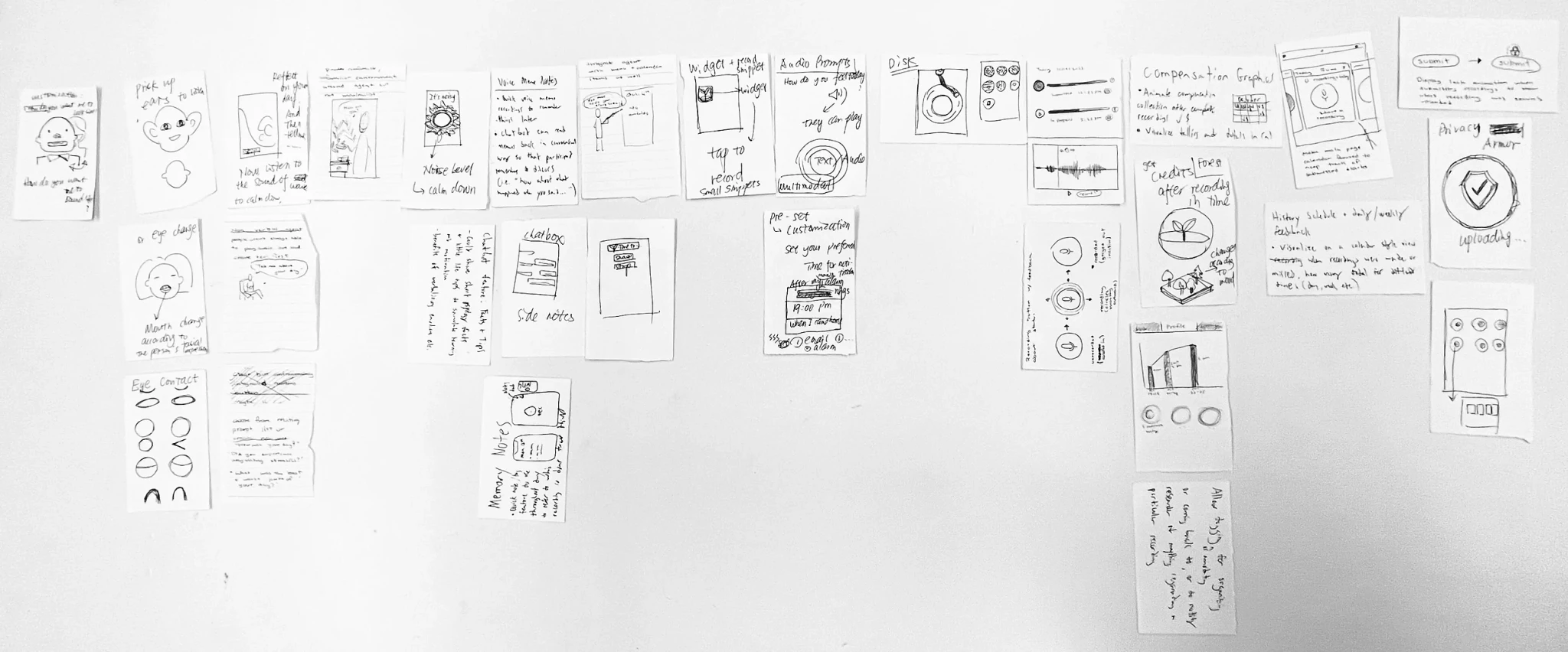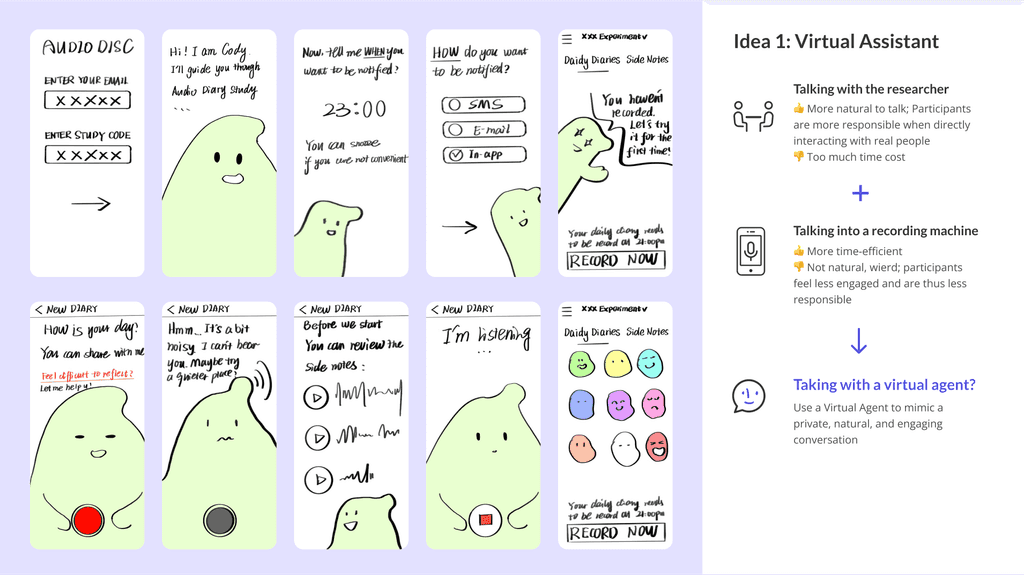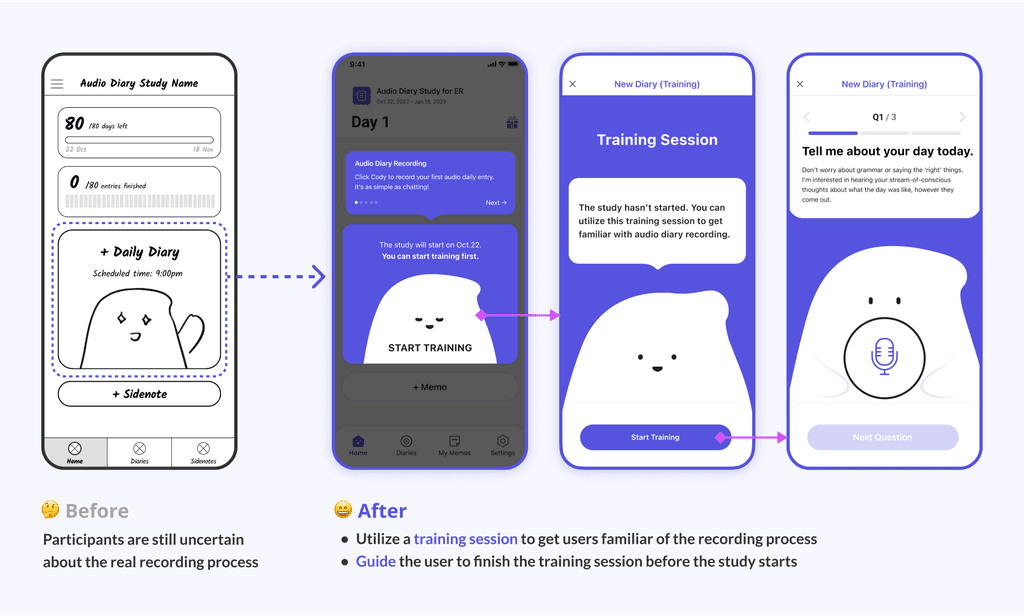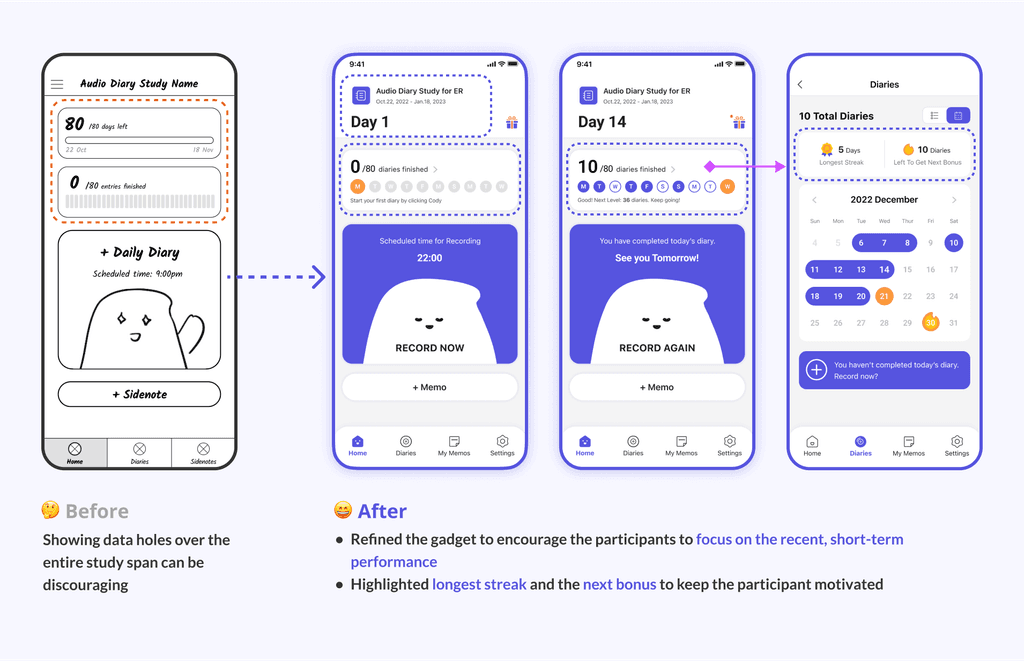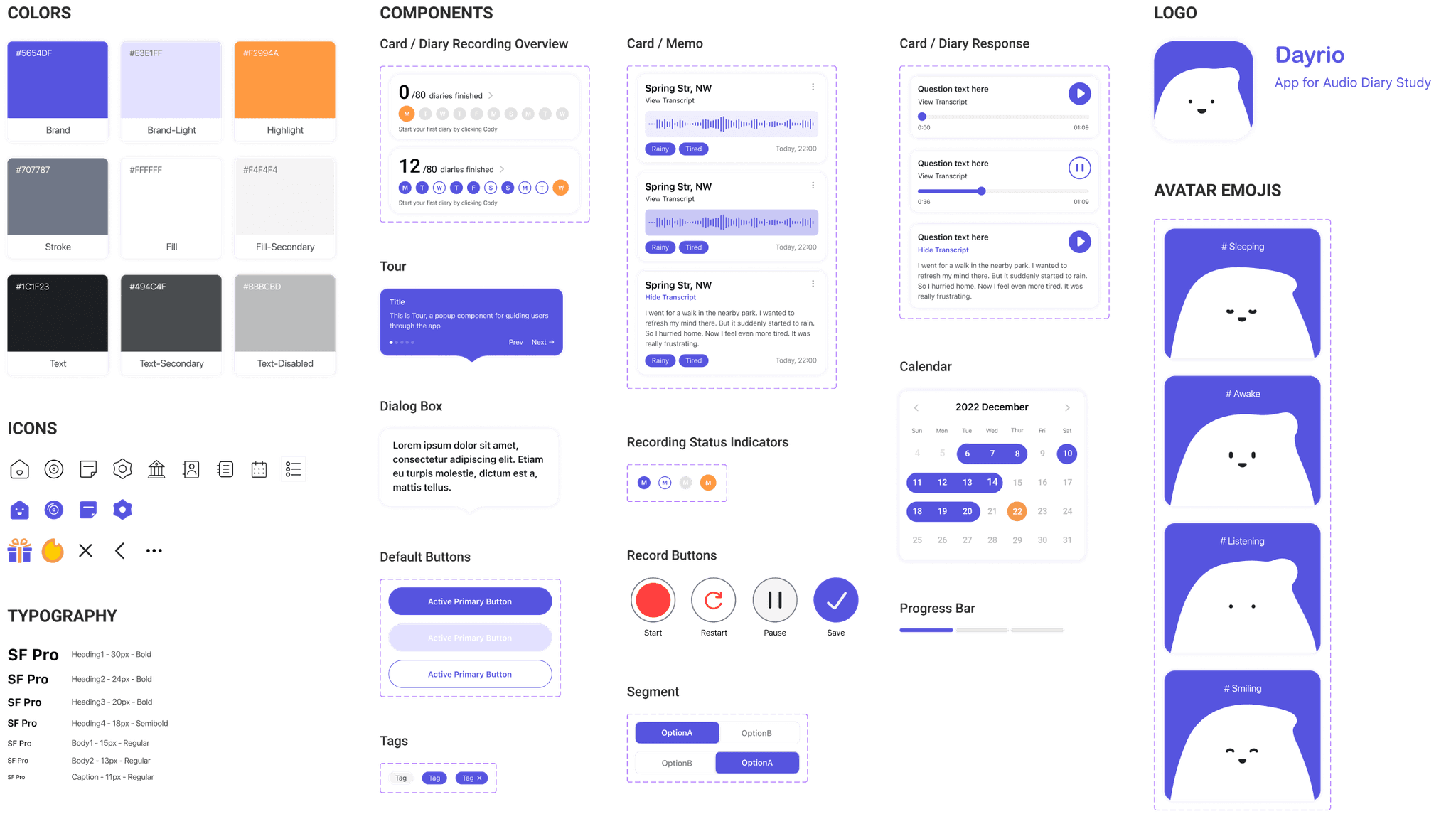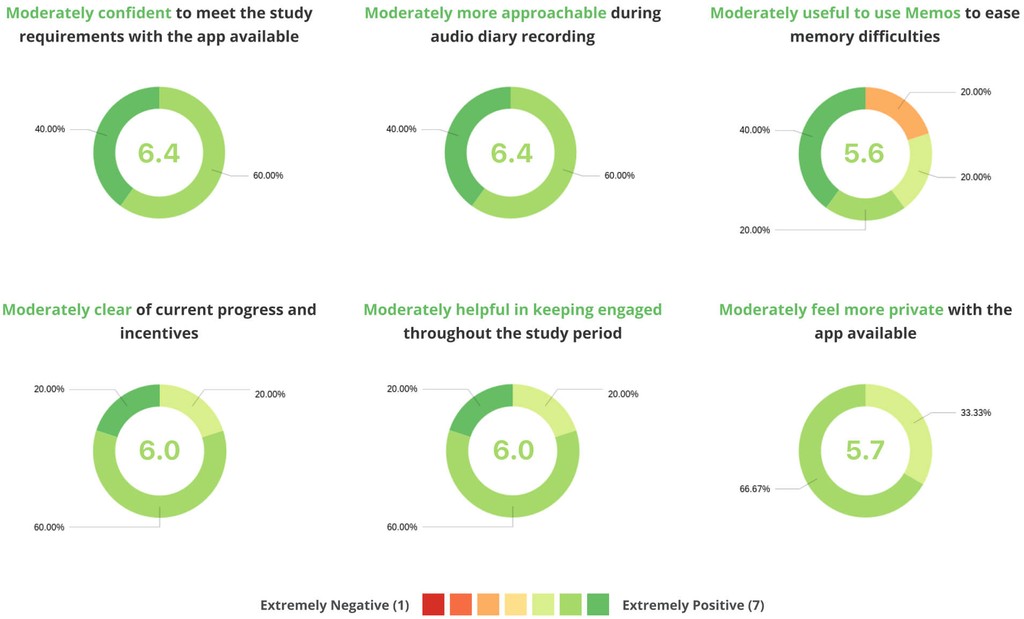My Roles -
For -
With -
Mentor: Bruce Walker
Group: Lina (Research), Hudson (Research), Ben (Design)
Duration -
Quick Glance.
I spearheaded the app design within a four-member team for this course project sponsored by the industry partner, AppHatchery, and our clients—leading psychologists at Emory University. Our prototype received high praise from both the sponsor and clients, leading to successful funding. It's slated for implementation this year, launching a pilot study with a real population 🎉.
Key abilities:
Design Goal Reframing
Journey Mapping
Emotional Design
Design System Building
Background.
Audio-diary method in Clinical Psychology study
Audio Diary Method is clinical psychologists' preferred method for collecting self-reports of participants, where participants verbally respond to pre-set questions about their daily lives. Audio diaries make it easier for participants to give a stream of consciousness and reduce the overhead of researchers in interviews.
However, current methods for collecting audio diaries are still quite traditional:
Problem.
Traditional methods for collecting audio diaries are unreliable due to 3 main issues
Through stakeholder interviews with our clients - lead clinical psychologists, and our sponsors, we learned that all the traditional methods often fail to collect reliable audio diaries from participants due to the following reasons:
Final Design.
Use a dedicated mobile app to simplify researcher-participant interaction + Create better participant experiences to ensure audio diary validity
We designed Dayrio, a dedicated mobile app designed for participants to conveniently record audio diaries, which are privately synced to researchers. To achieve the ultimate goal of ensuring the audio diary study validity, Dayrio creates a more private, approachable, and engaging audio diary study experience for participants.
Feature 1.
🤔 Problem: Lack effective communication tools for participant training, adding workload to researchers and causing confusion for participants.
💊 Solution: Introduce participants to the study procedure, setup, and the app UI through a welcoming virtual assistant, streamlining researchers' tasks and ensuring study validity.
1.
Feature 2.
Dialogue-Like Diary Recording
🤔 Pain points: Participants often feel awkward and weird to record their voice diaries into a “machine”, leading to too short or jammed voice recordings.
💊 Solution: Create a conversation-like experience with the virtual assistant to make audio diary recording more approachable, natural, and less anxious.
2.
3.
Feature 3.
Take "Memos" to Help Recall
🤔 Pain points: End-of-day diaries pose memory difficulties and involve memory bias. But real-time self-reports lack continuous stream summaries like daily diaries.
💊 Solution: Empower participants to create memos throughout the day for quick review, alleviating the memory challenges of end-of-day diary recording.
Feature 4.
Incentive & Progress Tracking
🤔 Pain points: Participants are less engaged in the longitudinal study due to the lack of motivation.
💊 Solution: Set short-term incentives and visualize the current progress of the study keep participants motivated and engaged throughout the study period.
4.
5.
Feature 5.
Personalized Reminder
🤔 Pain points: Participants may easily forget to record, causing data holes and impair the study validity.
💊 Solution: Enable users to customize reminders for diary recording during the onboarding and push notifications at the scheduled time
Generative Research.
Interviews with psychologists and participants
By meeting with sponsors and conducting desktop research, we have learned the problem space and sponsors’ initial expectations. We then conducted interviews with 4 clinical psychologists and 6 prior research participants to get first-hand information about their experience, pain points, needs, and expectations for the audio diary recording device / application.
Synthesize interview quotes to find common themes and key findings
To better inform design decisions and derive design implications, we synthesized user quotes and organized them based on their affinities to find the common themes and key findings from the interviews.
Key Findings.
4 key obstacles on the participants’ side hinder the success of audio diary studies
We synthesized all the data gathered from our surveys and interviews and organized them based on their affinities, to find patterns and common themes. 4 major findings emerged, indicating the importance of considering participants’ experience in audio diary studies to ensure the study success.
User Journey Maps.
Mapping out participants' experience throughout the audio diary study period
Considering the diversity of our participants, to better guide a universal design solution and empathize with potential users, we further synthesized the interview results and came up with 2 typical personas for the participants that cover distinctive motivations for participation and levels of tech literacy.
💡 Participants' experience throughout the study period is vital for research validity
As shown in the journey map, participants with little experience with audio recording have difficulties talking about their daily experiences into the recording machine in the early stage of the study, while some participants fail to keep recording on time in the later stage due to busy schedules or low motivation later on.
Design Goal Reframing.
Our ultimate goal is to help researchers collect valid audio diaries, but to achieve this goal, we need to:
Create a private, approachable and engaging audio diary study experience for participants
We then discussed with our stakeholders to align this reframed design goal and reached the concensus 🎉.
Brainstorming.
Group brainstorm crazy ideas
With the design goal and research findings in mind, we started sketching out our ideas to generate as many exciting ideas as possible. We then came together to share and discuss ideas, and grouped them together, culminating in the development of refined concepts that better solve known issues.
Concept Sketches.
Illustrate the top 2 concepts to solicit early feedback rapidly
I crafted the sketches based on the top 2 concepts we have. While the first idea, virtual assistant, focuses more on creating a dialogue-like audio recording experience to make it more natural and approachable, the second idea, record tape, focuses more on improving participants’ engagement and motivation in diary recording.
Concept Feedback.
Seek feedback from experienced psychologists on the design concepts
We invited clinic psychologists with rich experience in the audio diary method to evaluate the feasibility and effectiveness of our initial concepts. This approach expedited our acquisition of valuable insights and identified potential enhancements to the core features.
Core Features.
Refine the core features based on concept testing results
Building upon the insights gleaned from the concept feedback sessions, we proceeded to refine the app features and categorized them according to the specific design objectives they addressed.
We then discussed about the feasibility, effectiveness, and novelty, which led to the following core functionalities:
Goal #1. Improve the approachability of audio diary study to ensure validity from an early stage
Goal #2. Improve participants’ engagement throughout the study period to ensure long-term validity
Wireframes.
Generate wireframes to illustrate our concepts and the refined user flow
I further refined the user flow and crafted the wireframes to demonstrate the core features we proposed within a comprehensive user journey.
Feedback Sessions.
🚀 Rapidly gather insights into the practicality of our proposed features
Before jumping into high-fi design, we conducted interviews with 3 prior participants and 2 researchers to assess the utility and potential impact of our concepts. Here is a summary of user feedback on core features, and I will explain my design iterations based on user feedback in details down below.
Study Guide.
🤔 Still uncertain about the real recording process?
💡 Incorporate a training mode to acquaint participants before the study starts
Although participants reported feeling more confident about the study procedure and the app's features when using the user guide, they still expressed uncertainty regarding the actual recording process, as they hadn't yet experienced it. In light of this, researchers recommended the inclusion of a training session, a standard practice in their training procedures.
Virtual Assistant.
🤔 How to avoid unwanted influence of the avatar?
💡 Design a neutral avatar with subtle yet universally comprehensible expressions
Both participants and researchers we interviewed showed strong interest in the novel design of the virtual assistant and they agreed that it can really make the recording experience more approachable and natural. In the meanwhile, researchers also emphasized the need to ensure that the avatar's presence does not influence participants' emotional states during audio diary recording or cause unwanted bias.
Momentary Notes.
🤔 How to make notes efficient to review?
💡 Highlight important info for easy review in the “Memo Card”
Participants found the notes very helpful for easing remembering difficulties. And researchers also like the idea since the novel integration of notes combined the strengths of experience sampling method (real-time self-reports) into the audio diary method. However, participants wished a quicker way to review all the notes instead of reviewing individual notes.
Incentive & Progress Tracking
🤔 Too many “data holes” may discourage participants?
💡 “Small steps lead to big results”: Encourage short-term reflection
Participants acknowledged the value of progress tracking for self-reflection, but some expressed concerns about potential discouragement when encountering numerous data gaps. “Progress over the entire study span can move very slow.” In response, my gadget redesign incorporates motivational strategies focused on encouraging participants to achieve short-term goals and gradually complete the longitudinal study.
🤔 Don’t know where to check incentives?
💡 Show incentives more directly to trigger participants’ motivation
Participants love the incentive checking feature. However, a more straightforward way to check the incentives is desired, which can be clearer and more motivating.
Design System.
Visual style guide: Private, calm, and inviting
I opted purple and white as the primary color to create a calm and private atmosphere for audio diary recording. Orange is chosen to make the app more welcoming and motivating. Additionally, I embraced a flat design approach to ensure the app's aesthetic is clean and minimal.
Final Design.
For more details of the design and prototype, check the Final Solution above!
Hifi Evaluation.
Evaluate using think-aloud user testing and subjective ratings
User Evaluation: To evaluate if our design meets the overall design goal and the success criteria we set previously, we first moderated user testing with 4 participants with different knowledge and experiences in audio diary studies. We conducted think aloud user testing over Zoom where we set tasks for each concept.
Expert Evaluation: To gather expert feedback, we also conducted semi-structured interviews with 3 clinical psychologists with rich experience in audio daily diary method to gain expert feedback.
Subjective Ratings: To quantitatively evaluate the success of the design, we broke down our design goal into detailed, measurable ones and developed a questionnaire to gather feedback from users.
Quantitative results & Key findings
🎉 On average, users rated Moderately Positive (6) for all the questions, showing that our design is satisfying!
🤔 User participants' attitudes towards the Memo feature varied the most, mainly because users have different levels of memory difficulties and different habits of taking memos.
Product Impact.
🎉 Our design will be put into application!
Our design played a pivotal role in securing a grant for AppHatchery, enabling the app's development and further research. In addition, our design will be brought to life and officially launched in early 2023. The app will undergo a pilot study aimed at assisting frontline healthcare workers in combating burnout, in collaboration with clinical psychologists from Emory University.
Stakeholder Feedback.
🫶 Warm feedback from stakeholders
Our team was spoken highly by our clients and sponsors. Here are some feedback we got from our clients and the AppHatchery Team:
What I learned.
🚨 Users' subtle feelings also matter and may escalate into more significant issues
At first, I didn't perceive the challenge of making audio diary recordings approachable as a design issue. I saw it as an inherent difficulty with voice diaries, doubting how product design could address it. However, I came to recognize it as a pervasive user experience challenge deserving attention. I've learned to recognize, value, and dig deeper into users' genuine emotions. This project ignited my interest in emotional design, emphasizing the significance of integrating comfort and joy into user experience design.
🎯 Prioritize the ultimate product goals amidst conflicting stakeholder needs
My primary challenge was harmonizing the needs of researchers and participants. It was crucial to achieving a balance between user-friendliness and scientific rigor. Balancing these priorities presented conflicts, for example, while participants sought quick recordings, researchers aimed for comprehensive input. Encouraging participants to record more accurately while facilitating an easy recording experience becomes my strategy to serve the high-level goal of the research validity. I learned the importance of prioritizing our ultimate product goals amidst conflicting stakeholder needs.








